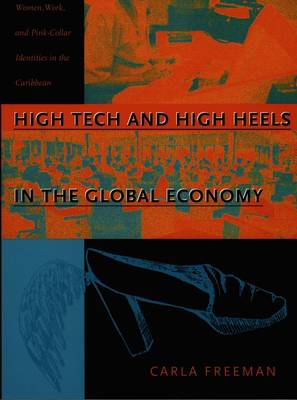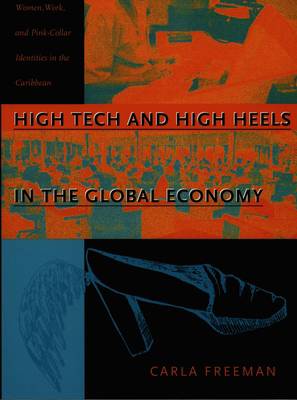
- Retrait en 2 heures
- Assortiment impressionnant
- Paiement sécurisé
- Toujours un magasin près de chez vous
- Retrait gratuit dans votre magasin Club
- 7.000.0000 titres dans notre catalogue
- Payer en toute sécurité
- Toujours un magasin près de chez vous
High Tech and High Heels in the Global Economy
Women, Work, and Pink-Collar Identities in the Caribbean
Carla Freeman
Livre broché | Anglais
45,95 €
+ 91 points
Description
High Tech and High Heels in the Global Economy is an ethnography of globalization positioned at the intersection between political economy and cultural studies. Carla Freeman's fieldwork in Barbados grounds the processes of transnational capitalism--production, consumption, and the crafting of modern identities--in the lives of Afro-Caribbean women working in a new high-tech industry called "informatics." It places gender at the center of transnational analysis, and local Caribbean culture and history at the center of global studies.
Freeman examines the expansion of the global assembly line into the realm of computer-based work, and focuses specifically on the incorporation of young Barbadian women into these high-tech informatics jobs. As such, Caribbean women are seen as integral not simply to the workings of globalization but as helping to shape its very form. Through the enactment of "professionalism" in both appearances and labor practices, and by insisting that motherhood and work go hand in hand, they re-define the companies' profile of "ideal" workers and create their own "pink-collar" identities. Through new modes of dress and imagemaking, the informatics workers seek to distinguish themselves from factory workers, and to achieve these new modes of consumption, they engage in a wide array of extra income earning activities. Freeman argues that for the new Barbadian pink-collar workers, the globalization of production cannot be viewed apart from the globalization of consumption. In doing so, she shows the connections between formal and informal economies, and challenges long-standing oppositions between first world consumers and third world producers, as well as white-collar and blue-collar labor.
Written in a style that allows the voices of the pink-collar workers to demonstrate the simultaneous burdens and pleasures of their work, High Tech and High Heels in the Global Economy will appeal to scholars and students in a wide range of disciplines, including anthropology, cultural studies, sociology, women's studies, political economy, and Caribbean studies, as well as labor and postcolonial studies.
Freeman examines the expansion of the global assembly line into the realm of computer-based work, and focuses specifically on the incorporation of young Barbadian women into these high-tech informatics jobs. As such, Caribbean women are seen as integral not simply to the workings of globalization but as helping to shape its very form. Through the enactment of "professionalism" in both appearances and labor practices, and by insisting that motherhood and work go hand in hand, they re-define the companies' profile of "ideal" workers and create their own "pink-collar" identities. Through new modes of dress and imagemaking, the informatics workers seek to distinguish themselves from factory workers, and to achieve these new modes of consumption, they engage in a wide array of extra income earning activities. Freeman argues that for the new Barbadian pink-collar workers, the globalization of production cannot be viewed apart from the globalization of consumption. In doing so, she shows the connections between formal and informal economies, and challenges long-standing oppositions between first world consumers and third world producers, as well as white-collar and blue-collar labor.
Written in a style that allows the voices of the pink-collar workers to demonstrate the simultaneous burdens and pleasures of their work, High Tech and High Heels in the Global Economy will appeal to scholars and students in a wide range of disciplines, including anthropology, cultural studies, sociology, women's studies, political economy, and Caribbean studies, as well as labor and postcolonial studies.
Spécifications
Parties prenantes
- Auteur(s) :
- Editeur:
Contenu
- Nombre de pages :
- 352
- Langue:
- Anglais
Caractéristiques
- EAN:
- 9780822324393
- Date de parution :
- 15-03-00
- Format:
- Livre broché
- Format numérique:
- Trade paperback (VS)
- Dimensions :
- 155 mm x 216 mm
- Poids :
- 544 g

Seulement chez Librairie Club
+ 91 points sur votre carte client de Librairie Club
Les avis
Nous publions uniquement les avis qui respectent les conditions requises. Consultez nos conditions pour les avis.





